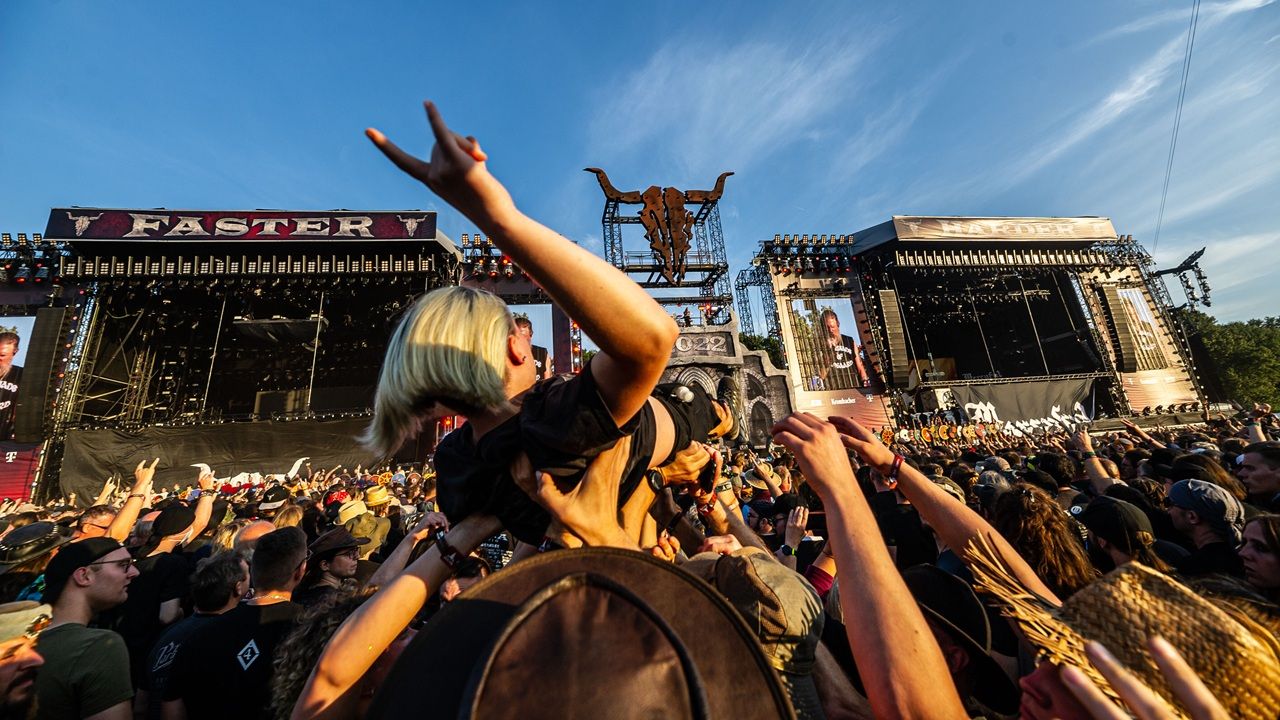
When Thomas Jensen co-founded Wacken Festival in 1990, the idea was simple. Book a few bands, get some beers in, and invite some mates to have the time of their lives. Thirty-five years later, the idea is still the same, except those ‘mates’ have ballooned to 85,000 metal fans.
“It’s pretty crazy,” he admits, bristling with pride. “I can’t believe how much it’s grown.”
Growing up, Thomas became obsessed with legendary performances. Queen at Wembley Stadium; Led Zeppelin at Knebworth; Motörhead at Hammersmith. But the chances of anything like that coming to his hometown – Wacken, a small village about an hour’s drive north of Hamburg – were slim to none.
So, in 1988, Thomas flew out to Donington to attend Monsters Of Rock. Headlined by Iron Maiden and Kiss, the iconic festival only cemented Thomas’s ambitions to bring the music he loved to his hometown.
“It was incredible,” he enthuses. “During [David Lee] Roth’s set, you could see Maiden building their set and it looked amazing.”
A year later, Thomas and co-founder Holger Hübner started making plans to host an event. The inaugural Wacken, held on August 24-25, 1990, had just six bands – mostly local – and attracted 800 people. This year’s four-day bill in July/August will be headlined by Guns N’ Roses, Machine Head, Gojira and Papa Roach, with a crowd of 85,000.
The festival might attract seasoned headliners, but Thomas also wants to give established bands a chance to step up. Last year, they showed they were ahead of the curve by getting Korn to headline (they close Download and top the bill at Hellfest this year). Now, Papa Roach will be the next nu metal stars to get the bump up to headliner status in the 2020s.
“Papa Roach is a great one for us,” Thomas says. “The team have been wanting them for a long time, so we’re really happy that they’re finally confirmed. We also got Gojira before they’d even got the invite for the Olympics. I had no idea they were doing it; I’d been doing interviews, and had the TV on with a cup of tea and the sound off. All of a sudden I saw this strange thing – ‘Hey, that looks like a metal band… Holy shit, Gojira at the Olympics!’ I had to crank up the volume. I think it’s great.”
Over the last three decades, many bands have risen through Wacken’s ranks. Amon Amarth first played the festival in 1999 on one of the small stages. Last year, they headlined to the sight of 85,000 fans rowing in a field. When Jinjer played in 2019, their early morning slot opening the Louder stage attracted an enormous crowd that confirmed the colossal buzz around the Ukrainian band. They returned in 2023 to an even bigger crowd on one of the festival’s two main stages.
In 2004, Wacken established the Metal Battle, which invites bands from around the world to compete and earn a chance to play at the festival. And with eight stages plus sideshow entertainment, there are many other international acts in the mix – Indian nu metallers Bloodywood planned their first overseas tour around a set there in 2019.
“That’s our duty; to push the boundaries a bit,” Thomas says. “This year we’ve got Hanabie coming from Japan, Skynd coming from Australia and singing about real crime. If you’d told me we would get these kinds of bands in 1990… It’s great just how diverse the scene is now. The beauty of a festival is being able to put all those kinds of bands together and have people discover new things as they walk by a stage.”
The Wacken site is now so large, it also takes over the neighbouring villages of Gribbohm, Bokelrehm and Holstenniendorf. It includes a post-apocalyptic-themed area called the Wasteland – complete with performers in Mad Max-style gear called the Wasteland Warriors – and a medieval village called Wackinger. There’s a farmer’s market, an outdoor swimming pool and a full metal church.
As Wacken’s profile has grown, multiple documentaries have been made – and screened – at the festival. Metal Hammer made our own short film in 2015, which can be found on our YouTube channel. Meanwhile, the 2024 metal comedy Heavier Trip is all about the protagonists’ journey to play there.
Thomas has seen the scene weather ups and downs, with interest in metal rising and falling – but he’s excited about the state it’s in at the moment. With bands such as Sleep Token and Ghost landing No.1 albums, there’s an influx of fans.
“There’s a lot of great festivals out there now, and I’m glad to see the development of places like Bloodstock or even some of the smaller independent festivals,” he says. “I remember when I managed Saxon [Thomas looked after the NWOBHM legends from 2000- 2016], we’d only be able to put on shows in Wolverhampton and London, that’d pretty much be it. Things are so much healthier now for the metal scene than at the beginning of the century, let’s put it that way.”
Next summer, Wacken celebrates its 35th birthday, having missed a couple of years to Covid. According to Thomas, it’ll be the biggest one yet.
“It’s going to be great,” Thomas says with a smile. “The whole point of the festival was to put on a party with our mates and listen to the music we love – and we’re still doing it.”
Wacken Open Air 2025 takes place from July 30 to August 2. For the full line-up, visit the official Wacken Website.







